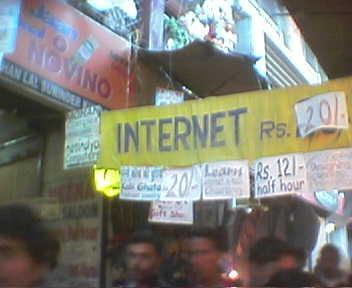Summary of a survey conducted on Mumbai Cyber cafes
ApiAp conducted a sample survey on Cyber Cafes in Mumbai. A random 40 cafes in Mumbai - South, Western Suburbs, & Central suburbs participated in the survey. The primary data collection and survey was done by Mr Anshu Shukla & Shrish Kumar Tiwari , students of the Indian Institute of Information Technology ( IIIT) Allahabad, India, The cyber café owners surveyed most of them offered Internet access, print & scan service.
- 77% of 40 respondents 's cafe existence is less than 3 years
- 92.5% claimed they are some what satisfied with business
- 80% of cafe own 6 to 10 terminals
- Most have invested less than Rs 200 thousand
- 97% of cafes operate from rented premises
- Almost all access Internet through cable internet (ADSL connection or extended LAN networks using cat5 cables)
- Median rate for Internet access fee is Rs 15/- per hour ( USD 0.34 )
- Median traffic ranges from 34 - 40 visitors a day
- Most cafes offer a significant discount to regular customers
- While 82% concurred to be their significant source of earning but at the same time 78% claimed other sources of earning too, popular options are PCO, DTP, Training etc
- 55% claimed they know most of the customers, 30% claimed they know some of them & only 15% knew none of their customer.
- When asked to rank the significant problems faced in operating the business: The number one problem was attributed to Business competition followed by Regulation problem, Hardware maintenance & last managing customers.
- Only 43% & 39% of respondents knew the concept of Hacking & Piracy. 65% felt that their cafe can be misused but none could explain how.
- 95% of those surveyed claim to maintain a register of visitors for sake of business accounting, 15% even ask for proof of identity.
Conclusion:
- The Cyber café operations are not sustainable; most of the operators are early entrepreneurs. Although many claimed to be satisfied by the opportunity but then a significant 77% of the owners are in the business for less than 3 years, It is worthy to note the industry is over 8 years old. & The café business as hand in hand with the Internet rage had peeked in year 2000 with the burst of Dot COM bubble. Perhaps many have not factored the long-term capital cost recovery in the relative high operating cash flow thus look attractive.
- The low investment requirement added to low entry barrier & low skill base makes an ideal opportunity for micro entrepreneurs to start a venture. Subsequently Cyber café do not seem to be the main stay of the operator’s livelihood. Net earnings seem just about a bit higher than a salaried job for the same skill set.
- Most of the visitors frequent the same cafes & operators too are acquainted to them. Further for sake of business accounting most do maintain a rudimentary cross check systems. Thus detection of cyber crime under cover of anonymity offered by cyber café is not very non comprehendible
- But inferring from their responses on possibility of misuse of cafes, it seems most of them have a hazy understanding on Cyber security issues. It may be possible the café owners can be made gullible into abetting the crime. The whole scale policing of cyber café have proved an ineffective solution but a little support and nurturing of these micro entrepreneur community by way of awareness and recognition can certainly make cyber crime in the cover of anonymity manageable. Thank you Anshu & Shirish & your other guides , Cyber Cafe operators owe you a lot ! We look forward more researchers like you & Anikar Haseloff take interest in this omni present yet anonymous participants in the ICT4D.

No comments:
Post a Comment